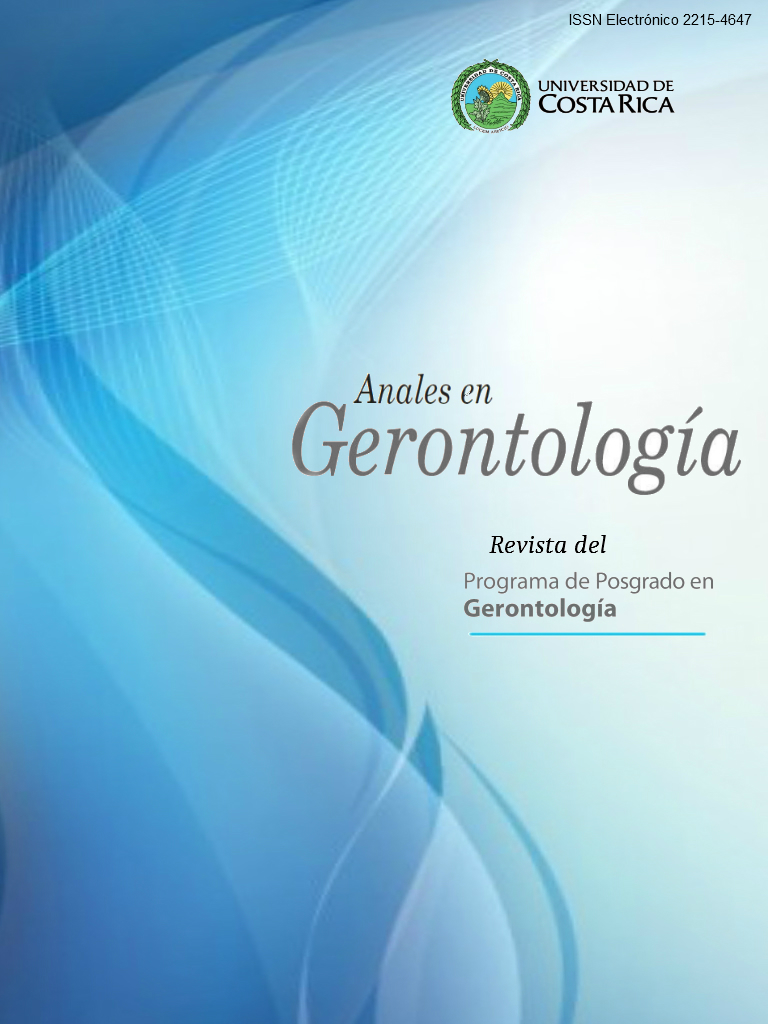Abstract
Objective: To use technological tools for gerontological assessment during the COVID-19 pandemic. Method: A descriptive, quantitative, cross-sectional study was conducted. Thirty people over 60 years of age with a mobile device or computer, and internet connection were included. Results: Strengths and limitations of technological tools were identified, as well as the most used means of communication by the elderly during the COVID-19 pandemic, and results were obtained on the geronto-geriatric assessment scales that evaluated affective state, cognitive state, family functionality and mistreatment. Conclusions: Technological tools are useful for social research, but present limitations for the search of qualitative and quantitative data in elderly people, however, this modality should be considered for the timely identification of various alterations in the functional, cognitive, affective, nutritional and environmental status.
References
Anthony, J., LeResche, L., Niaz, U., Korff, M. Von. & Folstein, M. (1982). Limits of the ’ Mini-Mental State’ as a screening test for dementia and delirium among hospital patients. Psychological Medicine, 12, 397–408. https://doi.org/doi:10.1017/s0033291700046730
Arias, J. L. (2020). Métodos de Investigación Online. En Facultad de Ciencias Médicas de Cienfuegos. https://repositorio.concytec.gob.pe/bitstream/20.500.12390/2237/1/AriasGonzales_MetodosDeInvestigacionOnline_libro.pdf
Armitage, R. & Nellums, L. B. (2020). COVID-19 and the consequences of isolating the elderly. The Lancet Public Health, 2667(20), 30061. https://doi.org/10.1016/S2468-2667(20)30061-X
Barcia, Q. (2020). Brecha Digital en Adultos Mayores: Accesibilidad Tecnológica y Redes Sociales. GIGAPP Estudios Working Papers, 7(180), 744–758.
Bellón, J. A., Delgado, A., Luna del Castillo, J. D. & Lardelli, P. (1996). Validity and reliability of the Duke-UNC-11 questionnaire of functional social support. Atencion primaria / Sociedad Española de Medicina de Familia y Comunitaria, 18(4), 153–163. http://www.elsevier.es/es-revista-atencion-primaria-27-articulo-validez-fiabilidad-del-cuestionario-funcion-14357
Chen, K. (2020). Use of Gerontechnology to Assist Older Adults to Cope with the COVID-19 Pandemic. ournal of the American Medical Directors Association, 21(January), 19–21. https://doi.org/10.1016/j.jamda.2020.05.021
Chokkanathan, S. (2018). Prevalence and correlates of elder mistreatment in Singapore. Journal of Elder Abuse & Neglect, 00(00), 1–13. https://doi.org/10.1080/08946566.2018.1471433
Escuder, S., Liesegang, R. y Rivoir, A. (2020). Usos y competencias digitales en personas mayores beneficiarias de un plan de inclusión digital en Uruguay. Psicología, Conocimiento y Sociedad, 10(1), 54–80. https://doi.org/doi: http://dx.doi.org/10.26864/PCS.v10.n1.3
Filipska, K., Biercewicz, M., Wiśniewski, A., Jabłońska, R., Królikowska, A., Główczewska-Siedlecka, E., Kędziora-Kornatowska, K. & Ślusarz, R. (2021). High rate of elder abuse in the time of covid-19—a cross sectional study of geriatric and neurology clinic patients. Journal of Clinical Medicine, 10(19). https://doi.org/10.3390/jcm10194532
Friedman, L. S., Avila, S., Rizvi, T., Partida, R. & Friedman, D. (2017). Physical Abuse of Elderly Adults: Victim Characteristics and Determinants of Revictimization. Journal of the American Geriatrics Society, 65(7), 1420–1426. https://doi.org/10.1111/jgs.14794
Giraldo, L. (2006). Malos tratos hacia las Personas Adultas Mayores: Una caracterización sociodemigráfica en la Ciudad de México. El Colegio de México.
Giraldo, L. (2020). Maltrato en la vejez: caracterización y prevalencia en la población mexicana. Notas de Población, 46(109), 119–145. https://doi.org/10.18356/338b1fce-es
Giraldo, L. & Rosas, O. (2012). Development and psychometric properties of the Geriatric. Geriatrics and Gerontology International, 1–9. https://doi.org/10.1111/j.1447-0594.2012.00894.x
Hernán, M., Lineros, C. y Ruiz, A. (2020). Cómo adaptar una investigación cualitativa a contextos de confinamiento. Gaceta Sanitaria, xx, 7–10. https://doi.org/10.1016/j.gaceta.2020.06.007
Huenchuan, S. (2021). Indicadores sobre envejecimiento y personas mayores en Centroamérica, México y el Caribe hispano. Comisión Económica para América y el Caribe (CEPAL), (LC/MEX/TS.
Instituto Nacional de Geriatría. (2020). Guía de instrumentos de evaluación geriátrica integral. http://www.geriatria.salud.gob.mx/descargas/publicaciones/Guia_InstrumentosGeriatrica_18-02-2020.pdf
Larrarte, S. L. (2015). Las posibilidades de internet en la reconfiguración de la red social primaria del adulto mayor , fracturada primária dos idosos , fraturada pelo efeito da migração. 14, 145–162.
Newman, M. G. & Zainal, N. H. (2020). The value of maintaining social connections for mental health in older people. The Lancet Public Health, 5(1), e12–e13. https://doi.org/10.1016/S2468-2667(19)30253-1
Piquero, A. R., Jennings, W. G., Jemison, E., Kaukinen, C. & Knaul, F. M. (2021). Domestic violence during the COVID-19 pandemic - Evidence from a systematic review and meta-analysis. Journal of Criminal Justice, 74(February), 101806. https://doi.org/10.1016/j.jcrimjus.2021.101806
Ruelas, M. y Pelcastre, B. (2017). El hogar como receptáculo de doble violencia ejercida contra las personas adultas mayores. En Gedisa (Ed.), Vejez y vulnerabilidad. Retratos de casos y perfiles de estudio en contextos diversos: grandes regiones, localidades rurales y territorios migrantes. (Primera ed, pp. 73–92). Universidad Autónoma del Estado de México.
Salas, M. y Ceminari, Y. (2021). Aislamiento, soledad y cuidados de las Personas Adultas Mayores. Reflexiones sobre el aislamiento como política de cuidado. Anales de Gerontología, 13, 252–263.
Senado de la República. (2014). Situación de los adultos mayores en México: salud, violencia y discriminación. Mirada Legislativa, 50, 1–28.
Song, Y., Qian, C. & Pickard, S. (2021). Age-related digital divide during the covid-19 pandemic in China. International Journal of Environmental Research and Public Health, 18(21). https://doi.org/10.3390/ijerph182111285
Suárez, M. y Alcalá, M. (2014). Apgar Familiar: Una Herramienta Para Detectar Disfunción Familiar. Revista Médica La Paz, 20(1), 53–57.
Tomasino, K., Lattie, E., Ho, J., Palac, H., Kaiser, S. & Mohr, D. (2017). Harnessing Peer Support in an Online Intervention for Older Adults with Depression. American Journal of Geriatric Psychiatry, 25(10), 1109–1119. https://doi.org/10.1016/j.jagp.2017.04.015.Harnessing
Tusa, F., Maza, J. y Lozano, K. (2020). Herramientas Digitales Para Investigadores. https://repositorio.concytec.gob.pe/bitstream/20.500.12390/2237/1/AriasGonzales_MetodosDeInvestigacionOnline_libro.pdf
Tyrrell, C. J. & Williams, K. N. (2020). The Paradox of Social Distancing: Implications for Older Adults in the Context of COVID-19. Psychological Trauma: Theory, Research, Practice, and Policy. https://doi.org/10.1037/tra0000845
Yesavage, J., Terence, R., Owen, L., Virginia, H., Michael, A. & Otto, L. (1983). Development and validation of a Geriatric Depression Screening Scale: A preliminary report. Journal of Psychiatric Research, 17(I), 37–49
##plugins.facebook.comentarios##

This work is licensed under a Creative Commons Attribution-NonCommercial-NoDerivatives 4.0 International License.
Copyright (c) 2022 Annals in Gerontology

